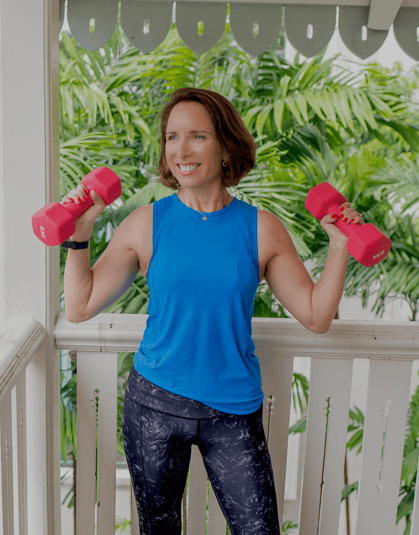The Importance of Weight Training post 40
If you’re over 40 years old; this article applies to you and I’d love you to read it.
HOLISTIC WELLBEING
Ellie
12/8/20234 min read


I’m going to tell you why I’ve changed my exercise focus, post 40.
Over the last few years my approach to exercise, for myself and my clients, has shifted. In my 20’s and 30’s the majority of my classes were high intensity cardio sessions; big heart rate rising, sweaty sessions. Brilliant!
However, over the last few years, as me and the majority of my clients moved into our 40’s, I’ve started shifting the focus. Whilst HIIT sessions definitely still feature on my radar, it's RESISTENCE/WEIGHT TRAINING that now also features heavily.
Resistance Training is super important for those over 40.
Let me explain the why…..
Firstly, long term health and wellbeing is always a tricky one to engage people in because, for many of us, it’s not an obvious and pressing pain point. I get it and it’s why I try my best to consider it on my clients behalf. My approach has always been to address my clients immediate pain points (their “I want to get fitter”, “I want to lose weight”, “I want to tone up” etc) whilst, all the while, taking into account their long term wellbeing.
But here’s what should be on your radar; whilst life expectancy has gone up, quality of life, in later years, is reducing.
We may be living longer but we’re not living well.
We are all very aware of the obesity pandemic; it’s this phenomenon alone that has often been cited as the sole culprit of our reduced wellness. However, in populations where obesity isn’t necessarily an issue, there are a record number of people suffering from metabolic and frailty syndromes. Current trends and future projections show there to be an alarmingly high increase in the number of people living with such syndromes across the globe.
More and more research is pointing towards the decrease in Musculoskeletal Strength and Wellbeing as being the underpinning cause. For this reason popular literature and narrative will likely move away from its obesity obsession and shift towards a focus on Muscle Health in what some are calling the ‘Muscle Millennium’.
Decline in Muscle Strength is now being seen as as much of a pandemic as obesity.
Why?
Reduced Muscle Strength impacts several of our body systems including our muscular, skeletal, metabolic, neural, respiratory and endocrine systems.
Specifically, LOW Muscle Strength is directly correlated to:
Increase in Insulin Resistance = BIG DEAL; decrease of the cells ability to utilize glucose effectively = type 2 Diabetes = long term effect on many major organs, including your heart, blood vessels, nerves, eyes and kidneys.
Increase in Sarcopenia (loss of muscle mass and strength) = BIG DEAL; decrease in muscle regeneration capacity = predictor of disability (linked to poor balance, gait, speed, falls and fractures).
Increase in Osteoporosis (reduction of bone density) = BIG DEAL; site specific osteoporosis = cause of fractures and breaks (particularly hip) = decrease in life expectancy.
Increase in Cognitive Decline = BIG DEAL; decline in cognitive health, working memory, focused attention = precursor to Alzheimer's Disease.
The musculoskeletal system is your body's armour.
Studies show that the Musculoskeletal system plays a big role in helping to protect you from, often seen as, age related diseases. As your body naturally begins to reduce its ability to regenerate itself; focused effort on maintaining muscle by building it, is super important. Incorporating Muscle/Resistance training (RT) into your routine is vital, especially in midlife and onwards…. And, the excellent news is that, it’s never too late to start resistance training (RT) and affect those trajectories.
So enough about the why….here’s the what.
Here’s what I recommend:
Start incorporating focused RT into your routine; 3-4 times a week (aim for something like 10 reps, 3/4 sets to exhaustion). You want to have checked off each muscle group at least a couple of times a week and have felt “the burn” sufficiently that you would be pushed to do another rep. (RT will also help decrease fat mass and manage menopausal induced sarcopenia more effectively).
Don’t give up the HIIT; HIIT training is still important in terms of challenging your cardiovascular and muscular systems. Aim for a HIIT session in addition 1-2 times a week.
Keep up your walking; walking is still the best exercise in terms of holistic wellbeing and self care.
Nourish yourself with good food and make sure you’re getting enough protein. For those who know me, know that I’ve been a lifelong veggie (I simply don’t really like meat and I want to save the planet ;-)) . For the most part, I’ve been super careful about making sure I include lots of plant based proteins into my diet (there’s a lot of beans, tofu and quinoa eaten in our house). However, as I get older, I know that my protein intake requires extra attention (protein, of course, is the precursor to muscle building; it’s responsible for cell growth and repair) so I have started making adjustments accordingly (like eating fish and eggs). How much protein and of course the protein/carb debate continues to rage on in popular literature online (for every article that argues it one way there will be another arguing it the other). Which is why I would say “if in doubt, consult a qualified dietician”.
Even if you’re well over 40 make sure you start resistance training now.
E x
https://www.ncbi.nlm.nih.gov/pmc/articles/PMC3168930/
https://www.medicalnewstoday.com/articles/323027#takeaway
https://www.mayoclinic.org/diseases-conditions/type-2-diabetes/symptoms-causes/syc-20351193
https://www.frontiersin.org/articles/10.3389/fneur.2022.833087/full
